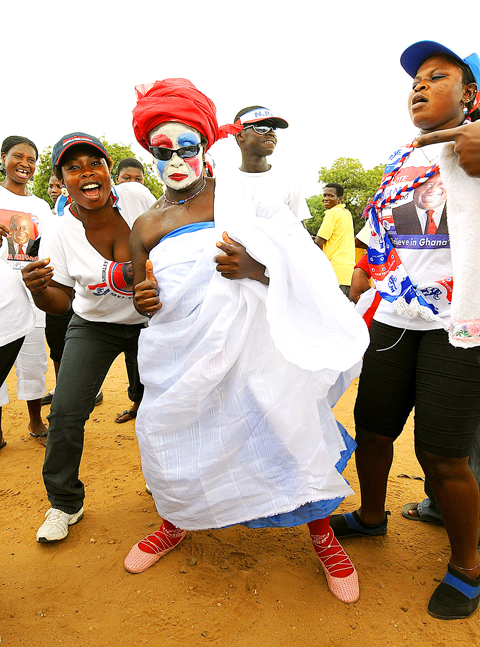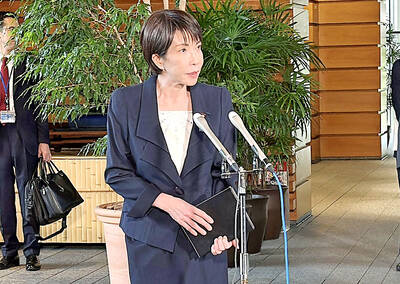Political scientists use a simple litmus test to determine if a country has a mature democracy: Has it had not just one — but two — successful handovers of power from one legitimately elected leader to another?
Most of the nations in Africa have flunked this test. Analysts and investors now have their eyes trained on Ghana, one of the continent’s rare exceptions, whose 23 million people are expected to join the ranks of the world’s stable democracies when they go to the polls today to elect their next president.
Unlike its neighbors whose rulers came to power in coups and never ceded control, Ghana suffered back-to-back coups in the 1970s and 1980s but then took a turn. After ruling for 11 years, ex-strongman Jerry Rawlings organized elections. He won two terms, then surprised the world by ceding power when his party’s candidate lost to Ghanaian President John Kufuor in the 2000 vote.

PHOTO: AFP
It’s now Kufuor’s turn to do so after two terms in office and analysts expect he will abide by term limits and step aside without a fuss, marking the second successful handover, a milestone not just for the country but also for Africa as whole.
Today’s election pits the ruling New Patriotic Party’s Nana Akufo-Addo against seven opposition candidates. Akufo-Addo’s main challenge comes from John Atta Mills, the candidate of Rawling’s National Democratic Congress.
“Moving around the continent, you can come up with — maybe — a handful of nations that have pulled this off,” says Africa expert Peter Pham, director of the Nelson Institute for International and Public Affairs at James Madison University. “That’s why this election is so significant.”
The nations that have met the litmus test are few and include Benin, which in 1991 was the first African nation to transfer power from a dictatorship to a democracy. Recent setbacks include Mauritania, which held its first democratic elections in over 20 years last year, only for those gains to be reversed in a coup one-and-a-half years later.
Catastrophic failures include Kenya and Zimbabwe, both of whose leaders refused to relinquish control after recent elections, causing their countries to descend into spasms of violence.
In this humid, traffic-choked capital, voters are keenly aware of the responsibility they bear. “We have an image to protect,” says Sylvia Annoh, spokeswoman for the country’s electoral commission.
“We are an example for Africa,” she says, adding that not only was Ghana the first African country to declare independence in 1957, it is now poised to become a model for the region.
Voters are also acutely aware of the stakes. With an annual growth rate topping 6 percent, the country is one of the continent’s few economic success stories. Over the past four years, foreign investment has grown over twenty-fold from around US$100 million in 2004 to US$2.6 billion this year, according to Rosa Whitaker, a former assistant US trade representative for Africa who now advises the government.
“When people ask me why I am so confident this election will go smoothly, I say because people have something to lose,” she says.
Even more so following the discovery last year of offshore oil reserves. The revenue from the discovery is expected to pump an extra US$2 billion to US$3 billion a year into the state purse, roughly a fifth of the country’s annual budget — a huge windfall for the winner of today’s election.
With a record of stunning growth, it’s no wonder that the New Patriotic Party is campaigning on the government’s record.
Akufo-Addo, a former minister in Kufuor’s administration, has planted billboards throughout the capital bearing the slogan, “We are moving forward.”
Yet many say there is little to show for all the statistics indicating success.
“If you think Ghana is doing so well, then hand me your British or American passport and I’ll hand you mine,” quips Kwesi Aning, an expert on politics who heads a department at the Kofi Annan International Peacekeeping Training Centre.

‘MOTHER’ OF THAILAND: In her glamorous heyday in the 1960s, former Thai queen Sirikit mingled with US presidents and superstars such as Elvis Presley The year-long funeral ceremony of former Thai queen Sirikit started yesterday, with grieving royalists set to salute the procession bringing her body to lie in state at Bangkok’s Grand Palace. Members of the royal family are venerated in Thailand, treated by many as semi-divine figures, and lavished with glowing media coverage and gold-adorned portraits hanging in public spaces and private homes nationwide. Sirikit, the mother of Thai King Vajiralongkorn and widow of the nation’s longest-reigning monarch, died late on Friday at the age of 93. Black-and-white tributes to the royal matriarch are being beamed onto towering digital advertizing billboards, on

Indonesia was to sign an agreement to repatriate two British nationals, including a grandmother languishing on death row for drug-related crimes, an Indonesian government source said yesterday. “The practical arrangement will be signed today. The transfer will be done immediately after the technical side of the transfer is agreed,” the source said, identifying Lindsay Sandiford and 35-year-old Shahab Shahabadi as the people being transferred. Sandiford, a grandmother, was sentenced to death on the island of Bali in 2013 after she was convicted of trafficking drugs. Customs officers found cocaine worth an estimated US$2.14 million hidden in a false bottom in Sandiford’s suitcase when

POWER ABUSE WORRY: Some people warned that the broad language of the treaty could lead to overreach by authorities and enable the repression of government critics Countries signed their first UN treaty targeting cybercrime in Hanoi yesterday, despite opposition from an unlikely band of tech companies and rights groups warning of expanded state surveillance. The new global legal framework aims to bolster international cooperation to fight digital crimes, from child pornography to transnational cyberscams and money laundering. More than 60 countries signed the declaration, which means it would go into force once ratified by those states. UN Secretary-General Antonio Guterres described the signing as an “important milestone,” and that it was “only the beginning.” “Every day, sophisticated scams destroy families, steal migrants and drain billions of dollars from our economy...

PRESSURE: Trump is expected to demand that Tokyo raise its defense spending, but Japan’s new foreign minister said the amount is less important than how it is spent Japan plans to show its determination to further build up its defense to rapidly adapt to changing warfare realities and growing tension in the region when US President Donald Trump visits Tokyo next week, Minister of Foreign Affairs Toshimitsu Motegi said. Japanese Prime Minister Sanae Takaichi’s administration is also finalizing a purchase package, including US pickups, soybeans and gas, to present to Trump, but would not commit to any new defense spending target at the meeting, a source with knowledge of the preparations said. The two leaders are to sit down in Tokyo on Monday and Tuesday next week during Trump’s first